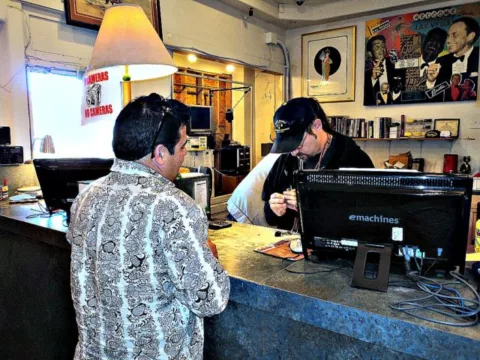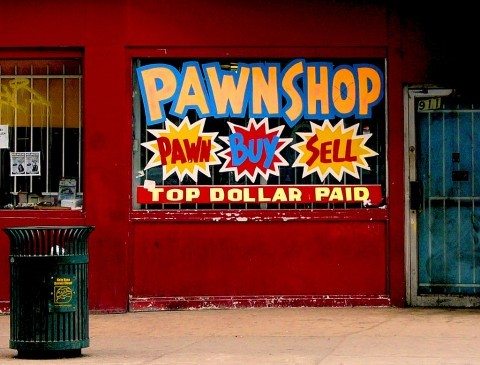Pawnshops are the world’s oldest financial institutions. Their history can be traced back 3000 years to ancient China.
The symbol for pawnshops has always been 3 gold balls.
See what that symbol stands for. (Hint, it’s not ” two to one, you won’t get your stuff back!”) Thinking of selling some of your stuff at a pawnshop in order to get a quick short-term loan?
Here are some interesting facts about how pawnshops work…
History Of Pawnshops
In 1988 there were only 50 members in the National Pawnbrokers Association. Now there are 3,000. That’s a huge rise and is indicative of the fact that there are a lot more pawnshops opening — because there is such a high demand for them. The recession may play a role in this as well.
- In 1911, there were 1,976 licensed pawnbrokers in the country, or about one for every 45,700 citizens.
- In 1988, there were approximately 6,900 pawnshops in the United States — one for every 2 commercial banks.
It’s such a thriving business, there are between 12,000 to 14,000 pawn shops in operation throughout the United States today.
Selling To A Pawnshop
If you need a short-term loan and don’t have good credit or a bank account, but you have an item of value, you can take your item to a pawn shop to be used as collateral and get the money you need.
Pawn transactions are the only type of consumer credit that requires reporting to local law enforcement agencies. In many states this reporting is required daily, and must include extremely sensitive personal information about the consumer (i.e. ethnicity, gender, address). Much of this information qualifies as “non-public personal information” under federal privacy law and is entitled to protection as such. Source
If you pay back the loan in time, then you get your property back, if not then it becomes the property of the pawnbroker who can then sell it. (In which case, you would have to buy your own item back at whatever price the pawnbroker wants to sell it for.)
The amount of interest a pawnbroker can charge depends on the laws in the state in which the pawnbroker is operating. For example, in New York, a pawnbroker cannot charge more than 4% interest.
Pawn shops base the value of the item on current appraised value, its current condition and the ability to sell the item. Pawnbrokers use research tools that they have at their disposal to determine an item’s value and get you the most money for the item. The appraisal process varies depending on the type of item—for example, jewelry is evaluated differently than a DVD player. All items that pawn shops buy or pawn are tested to ensure that it works properly. Source
The length of time that a pawnshop has to hold onto collateral before they can sell it depends on the laws in the state the pawnshop is operating as well. However, generally speaking it is 3 to 4 months.
Typically, loans are small averaging between $70 and $100, although they can be as small as $20 or as high as several thousand dollars depending on the value of the collateral. Contracts vary from state to state, but the average loan period is 90 days. Source
So, what’s the likelihood that you’ll be able to take advantage of the short-term loan offered by a pawnshop and get your item back in the end?
80% of those who borrow from pawnshops get their property back.
Buying From A Pawnshop
Selling to a pawnshop might seem safer than buying from one, but that’s not necessarily true.
Here’s what you probably don’t know:
- All items that are taken in by a pawnbroker are required by law to be listed with a city’s or state’s police office. (That’s one way that police help to prevent stolen merchandise from being sold.)
- Online pawn shops are also required to be listed with the city or state’s police office. This is also a very good way to avoid buying stolen items.
- Less than half of 1% of all pawned merchandise is identified as stolen goods.
- Merchandise that is high quality (such as jewelry, DVD players, and computers) can actually be found for half the price.
The Bottom Line On How Pawnshops Work
For those whose credit is less than perfect, or who need instant money without all the paperwork that goes with getting a bank loan or a credit card, pawning valuable items is one way to get money fast. Plus, you don’t have to worry about a credit check. Nor do you have to have a bank account.
Pawnshops will always be around. After all, they’ve lasted 3,000+ years already! I think the current state of the economy will always play a role in the number of pawnshops you’re likely to see on street corners in any given year.





